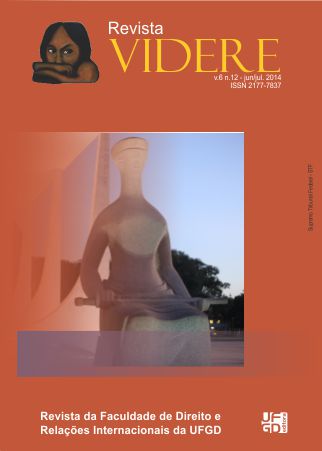Imigração haitiana e o Brasil: considerações sobre a negativa de caracterização do refúgio
Keywords:
Haitianos. Direito de refúgio. Non refoulement. Direitos humanos.Abstract
Em meados de 2010 o Haiti foi atingido por um terremoto que agravou os problemas sociais, políticos e econômicos daquele país, desencadeando um processo de migração em massa com destino, dentre outros lugares, ao Brasil. Face a um grande volume de pedidos de refúgio, foi criado o visto por razões humanitárias por meio da Resolução Normativa n.º 97 do Conselho Nacional de Imigração. Nesse contexto, “fecharam-se” as fronteiras, e os migrantes haitianos começaram a ser barrados, o que, em tese, seria uma evidente violação ao princípio do non refoulement. O Ministério Público Federal, ficando ciente da violação dos direitos humanos dos haitianos, propôs uma ação civil pública contra a União para assegurar, dentre outras coisas, que fosse reconhecido o direito de refúgio daqueles migrantes e para que fosse novamente liberada a sua entrada. O presente trabalho tem como propósito analisar a mencionada ação civil pública em seu mérito no referente ao direito de refúgio, que foi negado aos haitianos pelo juízo, e tecer algumas considerações sobre o caso.Downloads
Downloads
Published
How to Cite
Issue
Section
License
Authors must accept the publication rules when submitting the journal, as well as agree to the following terms:
(a) The Editorial Board reserves the right to make changes to the Portuguese language in the originals to maintain the cultured standard of the language, while respecting the style of the authors.
(b) Authors retain the copyright and grant the journal the right to first publication, with the work simultaneously licensed under the Attribution-NonCommercial-ShareAlike 3.0 Brazil (CC BY-NC-SA 3.0 BR) that allows: Share - copy and redistribute the material in any medium or format and Adapt - remix, transform, and create from the material. CC BY-NC-SA 3.0 BR considers the following terms:
- Attribution - You must give the appropriate credit, provide a link to the license and indicate whether changes have been made. You must do so under any reasonable circumstances, but in no way that would suggest that the licensor supports you or your use.
- NonCommercial - You may not use the material for commercial purposes.
- Sharing - If you remix, transform, or create from material, you must distribute your contributions under the same license as the original.
- No additional restrictions - You may not apply legal terms or technological measures that legally restrict others from doing anything that the license permits.
(c) After publication, authors are allowed and encouraged to publish and distribute their work online - in institutional repositories, personal page, social network or other scientific dissemination sites, as long as the publication is not for commercial purposes.



















